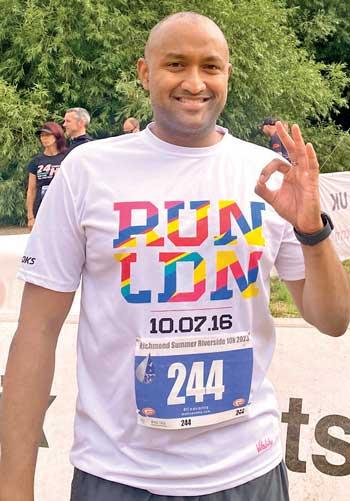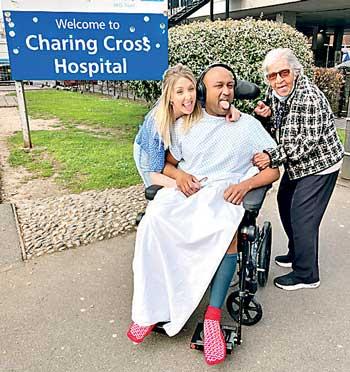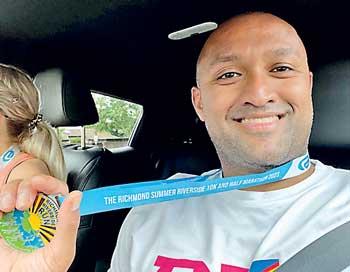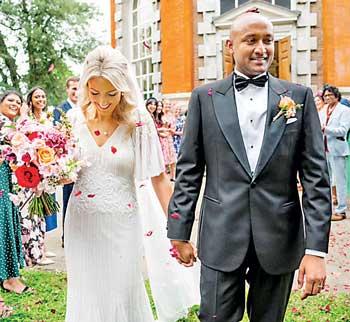27 Nov 2023 - {{hitsCtrl.values.hits}}
“I did not want to just lie in bed and dwell on being paralysed, because I knew I would look back with regret...
 Every once in awhile we come across people who epitomise courage and determination. They rise above adversity and come up trumps. One such person who inspired me with his stoicism is Andrew Logathasan. A British Sri Lankan with a heart to serve Sri Lankans in both the UK and Sri Lanka, I first met Andrew when he was organising a charity event. He also runs a Sri Lankan community page on social media which disseminates valuable information. It was with a sense of disbelief and shock that I digested the news that Andrew, a Cyber Security Consultant and Property Investor aged 42 had suffered a stroke. Despite the severity of his condition, Andrew would provide his friends and relatives with daily updates on his
Every once in awhile we come across people who epitomise courage and determination. They rise above adversity and come up trumps. One such person who inspired me with his stoicism is Andrew Logathasan. A British Sri Lankan with a heart to serve Sri Lankans in both the UK and Sri Lanka, I first met Andrew when he was organising a charity event. He also runs a Sri Lankan community page on social media which disseminates valuable information. It was with a sense of disbelief and shock that I digested the news that Andrew, a Cyber Security Consultant and Property Investor aged 42 had suffered a stroke. Despite the severity of his condition, Andrew would provide his friends and relatives with daily updates on his  condition. What struck me most that despite the uncertainty if he would live or die, Andrew was determined to give his best shot to live. While others may have resigned to their fate or blamed karma or even malefic planetary movements, Andrew literally stepped up to the challenge to fight for his survival.
condition. What struck me most that despite the uncertainty if he would live or die, Andrew was determined to give his best shot to live. While others may have resigned to their fate or blamed karma or even malefic planetary movements, Andrew literally stepped up to the challenge to fight for his survival.
Describing his initial thoughts when he had the stroke in the early hours of the morning, Andrew says “I was terrified about dying and leaving those I love and not being around for them anymore. I was
shocked that I had a stroke given how active and healthy I thought I was. I was also petrified about someone going in to my brain, the risks associated with brain surgery, what the future would hold for me and whether I would remain paralysed forever."
Andrew's treatment began with identifying the root cause and fixing it with minimally invasive procedures via puncture sites and going through his arteries to conduct interventional radiological neuro surgery. Andrew says "there was no cutting open my head to perform the surgery. Magnetic Resonance Angiogram (MRA) to find the root cause of the bleed was conducted by a Sri Lankan doctor specialising in neuroradiology. This gave me some reassurance and helped put my mind at ease knowing I would be looked after by a fellow Sri Lankan. The bleed was fixed on the 5th day via an embolization done through my arteries.Then it was a case of stroke rehabilitation at a special rehab unit consisting of physical and cognitive work. I was discharged after 34 days since the initial bleed."
Apart from having to cope with the physical restrictions associated with his stroke, Andrew also had to deal with it mentally. He explains that he felt like he was living the worst nightmare possible because he did not know what the future would hold for him. "I did not know if I would die, let alone if I would walk again in the first week. I was told by Rachel that I avoided looking at the faces of people visiting me in hospital over the first few days. When I saw people’s faces, I could see the fear in their eyes and I was already scared myself so I did not want to see their fear or how upset they were because I wanted to stay strong and hold myself together. When I asked doctors if I could walk again, I remember being told that some patients may walk by around 6 to 8 months. No psychological support was given while in hospital in the initial weeks, so I was left to work this out myself."
Far from wallowing in self pity, Andrew used visual motivational aids to help him in his recovery. One of the first things he asked for were two specific large framed photos of his parents who have always been a source of inspiration and strength as they have both shown determination through their lives. Andrew wanted a visual reminder of what he had come from and  what he had inside him to get through this period. A day or two after the bleed was fixed, Andrew asked Rachel to bring his running trainers and leave them by the door of his Intensive Care room so he could imagine walking out of the room in them even though he was still paralysed and had no idea if or when he could walk again.
what he had inside him to get through this period. A day or two after the bleed was fixed, Andrew asked Rachel to bring his running trainers and leave them by the door of his Intensive Care room so he could imagine walking out of the room in them even though he was still paralysed and had no idea if or when he could walk again.
Andrew spent every waking moment feeding his mind with positive information and maintaining positive thoughts. "Even though I only had the use of my right hand, I spent as much time as possible trying to soak up information that would keep me positive and motivated to recover. I scoured Youtube for videos of Stroke Survivor interviews, optimising stroke rehabilitation and anything motivational from the likes of Michael Jordan and Kobe Bryant. I shared two stroke survivor videos on my Facebook to show friends and family that there is a chance of recovery.
"Hearing a physiotherapist say ‘use it or lose it’, in reference to moving my arms and feet, was the best slap in the face to switch me into focused mode.Whenever anyone including medical staff asked me about my paralysis, I always caveated my response by saying ‘at the moment I have left sided paralysis’, to remind myself that I was paralysed temporarily."
Speaking about the goals he set himself, Andrew says "I did not want to just lie in bed and dwell on being paralysed, because I knew I would look back with regret. I was told that the first 6 months post stroke is when I will have the highest chances of making a recovery, so I set goals during this period to give me something to aim at and motivate me to make the most of the time I had. By reminding myself that even though I was facing the unknown, there is always a possibility that I could make a full recovery, so I needed to keep that in mind and keep doing whatever I could to help improve my recovery. Sharing some of his personal recovery tips, Andrew stresses the importance of focusing completely on doing everything you can that is within your control to improve the chances of your recovery. He advocates blocking out and  ignoring any distractions and focusing
ignoring any distractions and focusing
on what might go right and in your favour, rather that what could go wrong. He also suggests surrounding yourself with people that have a positive mindset or have gone through similar situations, either in person or via YouTube videos, listen to their perspectives or advice and selectively take on board whatever you feel will help you and keep pushing yourself to improve just a small amount each day in all rehabilitation activities whether it be physical or cognitive. Many Sri Lankans are adept at stiffling their emotions and bottling it all in. Andrew advises people to let their emotions out in whatever way they need to when they need to. "Be determined and keep pushing forward bit by bit, while celebrating every win or improvement along the way, no matter how small it is because over time the small wins will compound. Sleep is extremely important for the brain to recover and people must get enough at night and combine this with power naps during the day" he adds. Ever determined to triumph while recovering Andrew set himself a target of doing a 10km run.
"I will always remember how badly I wanted to be able to wiggle my toes, let alone lift my leg. So being able to now walk and run is an amazing feeling that I will never take for granted. Sometimes when walking or running I will think back to lying in that hospital bed when I was paralysed and feel a huge sense of gratitude for being back on my feet, which helps motivate me to keep going while doing things like training for the Richmond Summer Riverside 10km run which I completed 3.5 months after having the stroke.”
 Not one to rest on his laurels, Andrew has set his sights on running the London Marathon in 2025 to raise money to help other stroke patients and survivors.Walking down the aisle at his wedding and seeing him dance, it was unbelievable to imagine that this man was paralysed and staring death in the face only a few months ago. Andrew's story is a true example of mind over matter where he has risen like a phoenix from the ashes.
Not one to rest on his laurels, Andrew has set his sights on running the London Marathon in 2025 to raise money to help other stroke patients and survivors.Walking down the aisle at his wedding and seeing him dance, it was unbelievable to imagine that this man was paralysed and staring death in the face only a few months ago. Andrew's story is a true example of mind over matter where he has risen like a phoenix from the ashes.
(Pix Courtesy: Andrew)
28 Dec 2024 56 minute ago
27 Dec 2024 27 Dec 2024
27 Dec 2024 27 Dec 2024
27 Dec 2024 27 Dec 2024
27 Dec 2024 27 Dec 2024